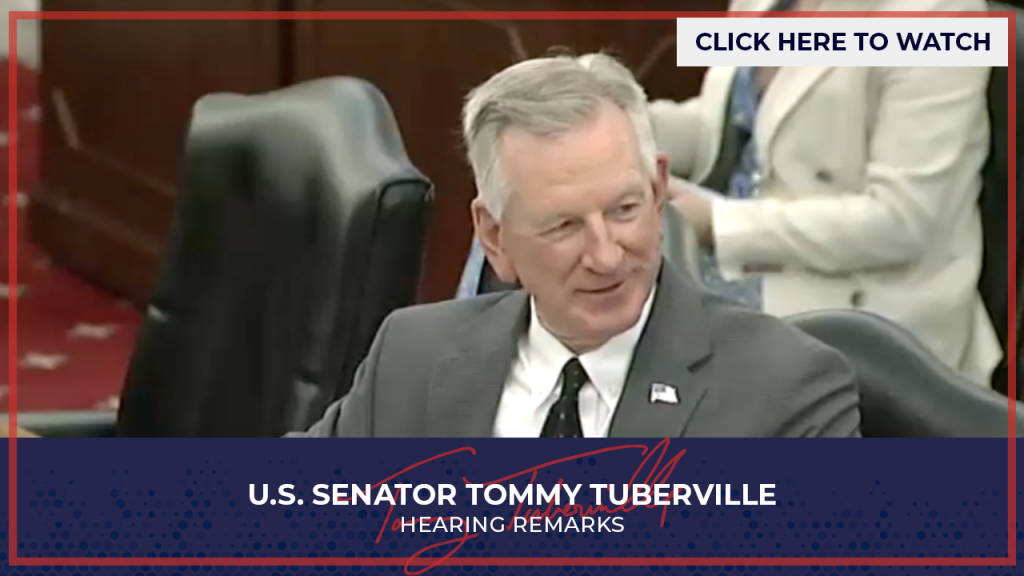WASHINGTON – U.S. Senator Tommy Tuberville (R-AL) spoke with the Honorable Stephen Vaden, President Trump’s nominee to be Deputy Secretary of Agriculture, and Tyler Clarkson the nominee for General Counsel of the U.S. Department of Agriculture at a U.S. Senate Agriculture, Nutrition, and Forestry (Ag) hearing. During the hearing, Senator Tuberville asked both nominees about what they will do to promote domestic trade and enforce already-existing SNAP work requirements, if they are confirmed.
Excerpts from Senator Tuberville’s remarks can be found below, and his full remarks can be found on YouTube or Rumble.

TUBERVILLE: “Thank you, Mr. Chairman. Thank you, Senator Justice. Awesome. I just had my first picture taken with Babydog, so I’m excited. That made my day. So, I’m glad you brought him up here today.”
JUSTICE: “It’s a girl.”
TUBERVILLE: “Oh, it’s a girl.”
JUSTICE: “A big girl.”
TUBERVILLE: “A big girl, yeah. Thank you, guys, for being here. And, like Senator Justice says, my phone—I’ve had to put in a new phone line for the farmers. They’re getting killed. It’s almost over. I mean, you know, they can’t even see the light at the end of the tunnel. And we need a Farm Bill, we need to help them, we need to understand the situation we’re in. Thank God for the tariffs, [and] for President Trump. He’s trying to right the ship. We’ll see what happens, but we’ve got to help our farmers.”
ON REDUCING TRADE BARRIERS FOR DOMESTIC FARMERS:
TUBERVILLE: “Mr. Vaden, domestic peanut growers in my state and across the country have been at a competitive disadvantage in the marketplace due to non-tariff trade barriers on peanuts from aflatoxin and in the European Union. Would you commit to ensuring USDA and the U.S. Trade Representative—USTR—would work together on President Trump’s agenda to reduce trade barriers and prioritize market access for our farmers?”
VADEN: “Absolutely, Senator. I know you just joined us, but earlier in response to a question from one of your colleagues, I noted that when it comes to American agriculture, oftentimes, the barriers that are actually keeping us out of the market aren’t formal tariffs, they’re not taxes, they’re, as you have noted with regard to your peanut farmers in Alabama—they are phony phytosanitary concerns. And those concerns cannot be allowed.”
[…]
VADEN: “Whether it be human health or animal and plant health. And they use it as a barrier to keep our products out. Our products grown by American farmers are grown with the best technology, with the best scientific advancement and there should be no concern from any international purchaser that if they’re buying American they’re getting anything other than the best. And I will have no problems, sir, voicing this to the President’s trade team.”
ON ENFORCING SNAP WORK REQUIREMENTS:
TUBERVILLE: “Thank you. This is for both of you. The Biden administration made individuals reliant on the SNAP program and the federal government to provide for them. SNAP should be a hand up, not a handout. And we need to get Americans back to work. I think we all agree with that. A big part of this is due to the Biden administration’s 21%increase in SNAP benefits through a Thrifty Food Plan update, amounting to over $250 billion in spending without congressional authority. Do either of you have ideas on how to enforce existing work requirements for SNAP recipients?”
VADEN: “Well, Senator, I think your question points out something very important. The work requirement that is contained within SNAP is not voluntary. It is a statutory mandate passed by this Congress. And failing to enforce the work requirement isn’t a policy choice. It’s a choice not to enforce the plain text of a law that Congress has passed. So, I appreciate you pointing out that the purpose of SNAP should be gauged on, not how many people are on it at any given period of time. But rather, as you have pointed out, how successful the program is at giving people a helping hand when they need it, and then working to transition them to self-sufficiency and entering the workforce so that they can become self-sustaining members of society. And that’s really how we ought to be judging the success of SNAP, how successful it is and helping people make that transition, and the work requirement is an important part of that.”
TUBERVILLE: “Thank you.”
CLARKSON: “Thank you for the question, Senator. I think the judge laid it out perfectly. PRWORA [Personal Responsibility and Work Opportunity Reconciliation Act] made very clear that there are work requirements associated with SNAP. I’d also note on my wife’s behalf, who was an Auburn graduate, ‘War Eagle.’ So I’d be remiss if I didn’t share that today.”
TUBERVILLE: “Thank you. Thank you. And we all wanna take care of people that need—that are needy. We really wanna take care of everybody, but the problem is we’re like a business. And we’ve run this thing too far. They’re not gonna be any money for anybody. We’re gonna be dead broke. And we’re headed in that direction. So, we need to be a precursor for what’s going on in this country and watch what’s happening and understand that we need to help people, but we can’t help everybody just because they don’t wanna do anything. And so, at the end of the day, we have got to understand the significance of our debt and the direction that all these entitlements give out to. Again, we are a generous country. We always have been. So, I know you guys will do a great job. We’re looking forward to voting for you. And so now I’ll turn it over to my colleague here.”
Senator Tommy Tuberville represents Alabama in the United States Senate and is a member of the Senate Armed Services, Agriculture, Veterans’ Affairs, HELP and Aging Committees.
###